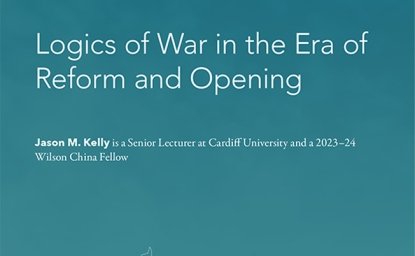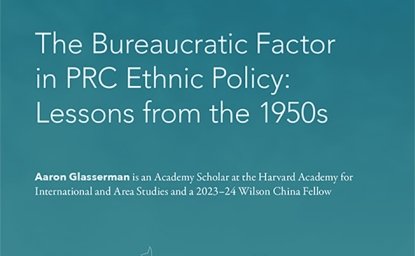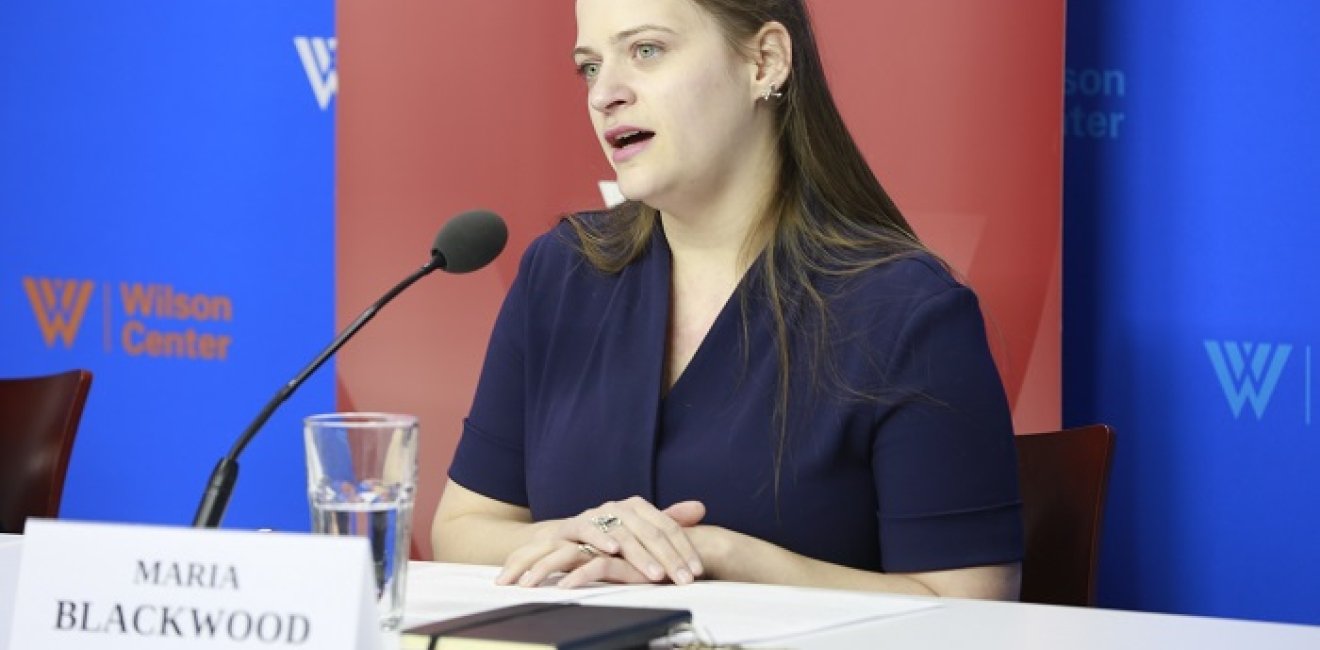Maria Blackwood is a former Title VIII Research Scholar with the Kennan Institute, where she focused her research on Central Asia and Soviet Kazakhstan. We asked her to reflect on her work at the Kennan Institute and tell us more about how she became interested in her research topic.
Q: Tell me about your background and what brought you to the Wilson Center.
I first started traveling to Central Asia when I was in college, and my first foray into exploring Kazakhstan’s history was my undergraduate thesis, which examined the pre-Revolutionary nationalist movement Alash. After college, I spent a year in the Paris office of an American law firm, working on international arbitration cases involving the Russian Federation. Although I had a very interesting experience, I quickly realized that I did not want to go to law school. One of my main motivations for entering a PhD program was the opportunity to engage very deeply with Central Asia and to spend time living and working in the region. Over the course of my time at Harvard, I spent over three years abroad, primarily conducting archival research in Kazakhstan. I also got to travel fairly extensively in the region (my goal is to make it to all 15 former Soviet republics—only two to go!). I was thrilled to have the opportunity to continue my research at the Wilson Center after I completed my PhD.
Q: Talk about what you are working on here.
I am working on a book manuscript that builds on my PhD dissertation, which focused on the first generation of Kazakhs who joined the Communist Party and entered its upper ranks. Because conditions in the Kazakh steppe were so far removed from the Marxist revolutionary program, examining the first generation of Kazakh Bolsheviks provides a valuable lens for exploring the interrelated processes of nation-building, modernization, and Sovietization in Central Asia, and in the Soviet Union more broadly.
I argue that their mediation between Communist ideology and local realities was crucial to determining the contours of Soviet Kazakhstan and its institutions, and that their stories demonstrate both the reach and the limits of the Soviet transformative project as a process that was contentious and participatory, both empowering and repressive. I outline the importance of pre-Revolutionary ideas and relationships as they were translated into new, Soviet conditions, arguing that personal ties predating 1917 were often more important than ideology. Analyzing their personal and professional trajectories, I contend that, despite the colonial and imperial dimensions of Soviet rule, local Bolsheviks were not just intermediaries in a Soviet "civilizing mission," but actively shaped Soviet Kazakhstan both figuratively and literally, establishing its borders and pushing for policies that aligned with their vision of what the Kazakh nation was. In the book project, I illuminate the enduring legacy of imperial and colonial structures in the Soviet Union and its successor states, demonstrating the degree to which education, professional experience, and social capital acquired before the Russian Revolution continued to reverberate across the Soviet period, and beyond. Moreover, I show how multi-generational family connections established in the first decades of Soviet rule continue to be relevant to Kazakhstan’s political, social, and cultural landscape.
Q: How did you become interested in your current research topic?
To me, the Soviet Union—like its predecessor, Imperial Russia—has always been most interesting as a multiethnic entity, a unique agglomeration of languages, peoples, and faiths. I am especially interested in the late tsarist and early Soviet period, when reformers and revolutionaries, both Russian and non-Russian, grappled with the nationalities question as they sought to forge a modern state. It was a period of change and chaos, and the establishment of Soviet power was a messy process, rife with unintended consequences. Many of the transformations of the 1920s were most dramatic (and most devastating) in Central Asia, making this region particularly important to understanding the broader Soviet project. One of the factors that drew me to this specific avenue for exploring Soviet Central Asia was the wealth of fascinating individuals involved, and I try to make use of personal materials and personal stories as much as possible. My work is fundamentally about individuals interacting with and exercising power in the context of a regime that was characterized by multifaceted contradictions. Examining individual trajectories illuminates Soviet politics and society in all its complexity.
Q: Why does your research matter?
In de-centering the study of the Russian Empire and the Soviet Union and emphasizing the concrete destinies of specific individuals, my research explores the practical implications of state ideology and state projects. While theorizing Soviet nationalities policy has been a salient subject in the social sciences for over twenty years, my project aims to establish how nationality actually functioned within Soviet power structures at the republic level. The issue of intra-Party dynamics, including the formation of elites and the role of nationality within Party structures, received a fair amount of attention from political scientists in the 1980s, a period which produced many studies of leadership dynamics within the Communist Party.
Nevertheless, before the disintegration of the Soviet Union and the opening of Soviet archives, Western scholars openly admitted to knowing “remarkably little about the details” of the nomenklatura system. In the two decades following the collapse of the Soviet Union and the opening of the archives, scholars studying Soviet nationalities policy have predominantly focused on centrally based decision-making and, even when examining specific republics, emphasize the general patterns made apparent by bureaucratic documents. Building on this existing literature, my research shifts the emphasis to concrete individual experience at the local level, making possible a detailed examination of what central policies meant on the ground. In doing so, I consider the legacies of tsarist administration and settler colonialism and outline the making of Soviet Kazakhstan as a process that was contentious, participatory, and highly contingent.
Q: What is the most challenging aspect of your research?
One of the most interesting aspects of my research is also the most challenging. Personal histories of the Soviet period are fascinating, but often tragic. Indeed, the vast majority of the people I write about fell victim to Soviet repression. I think it is important to approach their stories with both empathy and objectivity. I have been very fortunate to have access to a range of personal materials and personal archives. Because in many cases such materials were preserved by family members despite the difficulties and dangers involved, I also feel a great sense of responsibility to the material and to the people who have preserved it.
Q: What do you hope the impact of your research will be?
I hope my book will contribute to a fuller understanding of the early Soviet period and its continued reverberation.
The opinions expressed in this article are those solely of the authors and do not reflect the views of the Kennan Institute.
Author

Ph.D., Harvard University

Kennan Institute
After more than 50 years as a vital part of the Wilson Center legacy, the Kennan Institute has become an independent think tank. You can find the current website for the Kennan Institute at kennaninstitute.org. Please look for future announcements about partnership activities between the Wilson Center and the Kennan Institute at Wilson Center Press Room. The Kennan Institute is the premier US center for advanced research on Eurasia and the oldest and largest regional program at the Woodrow Wilson International Center for Scholars. The Kennan Institute is committed to improving American understanding of Russia, Ukraine, Central Asia, the South Caucasus, and the surrounding region through research and exchange. Read more

Explore More
Browse Insights & Analysis
Maria Blackwood

Logics of War in the Era of Reform and Opening


